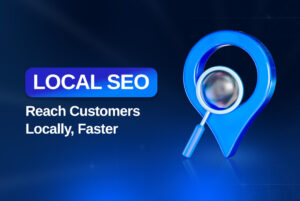In today’s digital age, where consumers increasingly rely on search engines to find local businesses, local search engine optimization (SEO) has become a crucial strategy for small businesses. By optimizing your online presence for local search, you can significantly increase your visibility, attract more customers, and drive growth.
What is Local SEO?
Local SEO is a subset of SEO that focuses on optimizing your website and online presence to rank higher in local search engine results pages (SERPs) when users search for products or services near their location. This involves optimizing various elements, including your website, Google My Business listing, and online directories, to ensure your business appears at the top of local search results.
Why is Local SEO Important?
- Increased Visibility: Local SEO helps your business appear prominently in local search results, making it easier for potential customers to find you.
- Targeted Audience: By optimizing for local search, you can reach a highly targeted audience of customers in your geographic area.
- Improved Customer Acquisition: Local SEO can drive more foot traffic to your physical location and increase online sales.
- Enhanced Brand Reputation: Positive local search rankings can help build your business’s reputation and credibility.
- Competitive Advantage: By effectively implementing local SEO strategies, you can gain a competitive edge over businesses that neglect this crucial aspect of digital marketing.
Key Elements of Local SEO
-
Google My Business Optimization
- Complete and Accurate Information: Ensure your Google My Business listing is accurate and up-to-date with your business name, address, phone number (NAP), website, hours of operation, and relevant categories.
- High-Quality Images: Use high-quality images to showcase your business, products, or services.
- Positive Reviews: Encourage customers to leave positive reviews on your Google My Business listing.
- Regular Updates: Keep your listing updated with any changes, such as business hours or promotion.
-
On-Page Optimization
-
- Keyword Research: Identify relevant local keywords that your target audience is searching for.
- Title Tag Optimization: Use your target keywords in your title tags to improve your search engine rankings.
- Meta Description Optimization: Write compelling meta descriptions that include your target keywords and entice users to click through.
- Header Tag Optimization: Use header tags (H1, H2, etc.) to structure your content and include relevant keywords.
- Content Optimization: Create high-quality, informative content that addresses your target audience’s needs and includes local keywords.
-
Local Citations
- Consistency: Ensure your business information is consistent across all online directories.
- Quality Directories: Focus on high-quality directories that are relevant to your industry.
- NAP Consistency: Maintain consistency in your NAP (Name, Address, Phone number) information across all citations.
-
Link Building
- Local Links: Build links from local websites and directories to improve your local search rankings.
- High-Quality Links: Focus on building links from reputable websites.
- Nofollow Links: While nofollow links may not directly impact your rankings, they can still contribute to your website’s authority.
-
Mobile Optimization
- Responsive Design: Ensure your website is mobile-friendly to provide a seamless user experience.
- Page Speed: Optimize your website’s loading speed for mobile devices.
- Mobile-Specific Content: Consider creating mobile-specific content or features.
-
Review Management
- Monitor Reviews: Regularly monitor online reviews on platforms like Google My Business, Yelp, and TripAdvisor.
- Respond to Reviews: Respond to both positive and negative reviews promptly and professionally.
- Encourage Positive Reviews: Ask satisfied customers to leave reviews.
Local SEO Tips for Specific Industries
- Restaurants: Optimize your menu for local search, use high-quality food photos, and leverage online ordering platforms.
- Service-Based Businesses: Highlight your location and service areas, showcase customer testimonials, and offer online booking options.
- Retail Stores: Optimize your product pages with relevant keywords, use high-quality product images, and promote in-store events.
Tools and Resources
- Google My Business: Create and manage your business listing.
- Google Search Console: Monitor your website’s performance in search results.
- Google Analytics: Track website traffic and user behavior.
- Local SEO Tools: Consider using tools like Moz Local, BrightLocal, and SEMrush for in-depth local SEO analysis and optimization.
Conclusion
By effectively implementing local SEO strategies, small businesses can significantly improve their online visibility, attract more customers, and drive growth. By understanding the key elements of local SEO and tailoring your approach to your specific industry, you can position your business as a leader in your local market.









